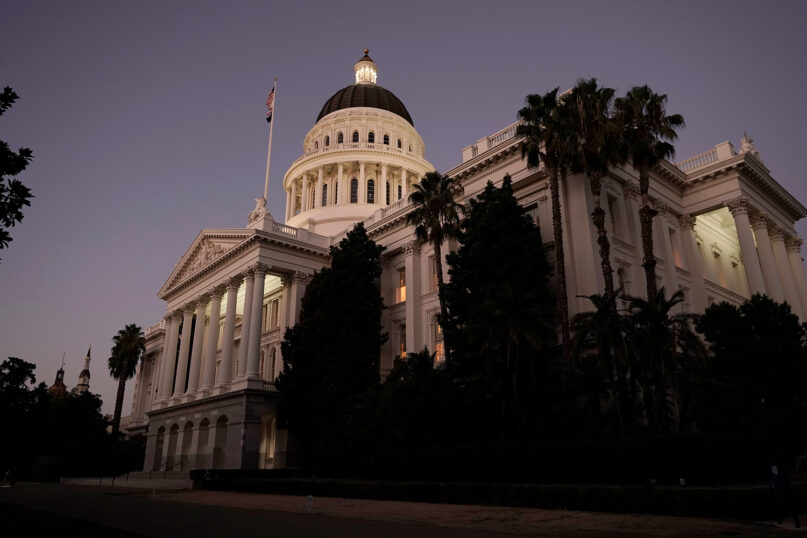(RNS) — The Hindu American Foundation has filed a complaint against the state of California, objecting to a recent caste discrimination lawsuit that the group said “violates the constitutional rights of Hindu Americans.”
“By falsely claiming that Hindu Americans inherently hold discriminatory beliefs in a caste system, and these beliefs and practices are ‘inherent’ to the Hindu religion,” said Suhag Shukla, attorney and executive director of the Hindu American Foundation, in the complaint filed Thursday (Sept. 22), “the State is treating Hindus in a manner that is different from the way it treats every other religious group.”
In a landmark suit originally filed in 2020, an anonymous Cisco employee in California claimed his Hindu supervisors cut him out of meetings and failed to promote him because he is a Dalit, a member of a lowest stratum of South Asia’s social and religious caste hierarchy. He further claimed that Cisco officials retaliated against him after he brought the discrimination to their attention.
Cisco maintained that there was “no evidence” that he suffered either discrimination or retaliation specifically through the “Indian caste system.”’
RELATED: How California State University is unjustly targeting South Asians
The Hindu American Foundation has long said that ending caste discrimination is a “worthy goal” that directly furthers Hinduism’s belief in the equal and divine essence of all people. The foundation also says that caste is not a core tenet of the Hindu religion and should not be assumed as such by the California Department of Civil Rights.
A spokesperson for the Department of Civil Rights said it would respond to HAF’s complaint in court.
The Cisco lawsuit comes as some Hindus have pushed for various American institutions, from corporations to universities, to officially recognize caste discrimination. In a 2018 report cited in the original lawsuit, the Dalit civil rights group Equality Labs found that 67% of Dalits surveyed felt unfairly treated at their U.S. workplaces.
In 2016, the same group found a third of Hindu students in the U.S. reported experiencing caste discrimination. Dalits have cited instances of employment discrimination at several companies, including Alphabet, the company that owns Google, and Microsoft.
RELATED: Why Cal State’s new caste discrimination policy is a critical step
The International Commission for Dalit Rights, a 2-decade-old organization based in Virginia, has repeatedly but unsuccessfully pressed the U.S. Equal Employment Opportunity Commission to recognize casteism against historically oppressed groups as “an urgent contemporary U.S. civil rights and social justice issue.”
In 2020, following the lead of Brandeis University and Colby College, the California State University system passed a resolution to add caste as a category of discrimination, making it easier for students and faculty to report anti-Dalit bias. In response, HAF led a petition against the move and it was signed by more than 80 faculty of Indian origin.
HAF insisted then that treating caste as a specific class of discrimination is a “misguided overreach.” They argued that it is unconstitutional to identify a form of prejudice held only by people of one faith or national background as “so entirely different and abhorrent that it renders this group a suspect class meriting special monitoring and policing.”
Sunil Kumar, a professor of engineering at San Diego State University, wrote at the time, “Rather than redressing discrimination, it will actually cause discrimination by unconstitutionally singling out and targeting Hindu faculty of Indian and South Asian descent as members of a suspect class because of deeply entrenched, false stereotypes about Indians, Hindus, and caste.”
At the crux of the HAF lawsuit is the question of whether caste is inherently tied to Hindu dharma, a widely misunderstood issue that stems across time and institution. Some argue that caste was imposed on Indian and other historically Hindu people by colonial administrators during British rule of South Asia and that it no longer plays a part in everyday life. Other Hindus call this view disingenuous, saying caste has its origins in Hindu scripture, which is still used to legitimize it. They also point out that caste is found among Hindus outside South Asia.
RELATED: How American couples’ ‘inter-Hindu’ marriages are changing the faith
“As Hindus, we work to uplift a vision of Hindu identity that acknowledges this history, but also rejects caste as a betrayal of our traditions’ highest teachings of human dignity and equality,” said Ria Chakrabarty, policy director for the advocacy group Hindus for Human Rights.
Chakrabarty said Hindus need to acknowledge the caste system as it operates today, rather than argue over its origins, before they can help solve the discrimination many say they’ve encountered.
“In the meantime, we will stand shoulder to shoulder with our Dalit American siblings in their fight against discrimination and ensure that caste is a protected category for civil rights,” said Chakrabarty.





